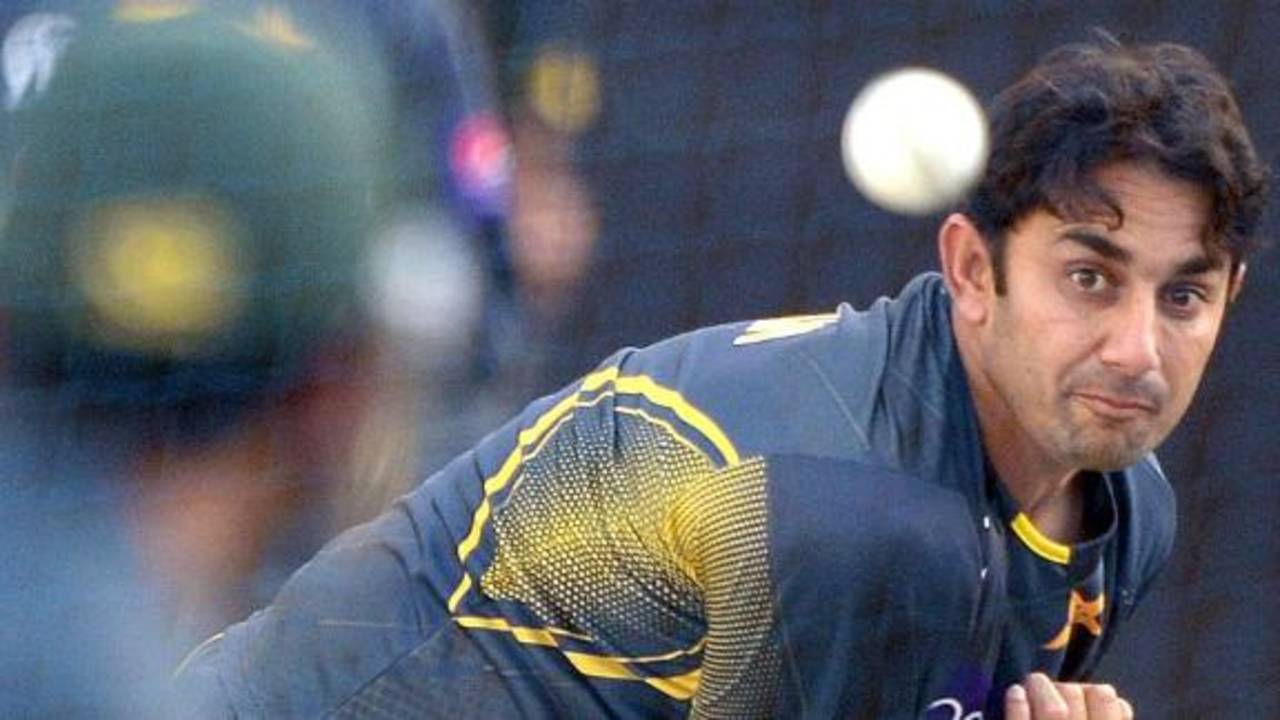Ajmal's flex more than twice legal limit - ICC report
Saeed Ajmal's average elbow extension is more than twice the permissible limit of 15 degrees, according to an ICC report available with ESPNcricinfo following biomechanical testing of his bowling action
ESPNcricinfo staff
12-Sep-2014

Saeed Ajmal's average elbow extension went up to 42 degrees according to the ICC report•AFP
Saeed Ajmal's average elbow extension is more than twice the permissible limit of 15 degrees, according to an ICC report available with ESPNcricinfo following biomechanical testing of his bowling action.
Ajmal, who was banned on September 9 after tests at the National Cricket Centre in Brisbane, was found to flex his elbow up to an average of 42 degrees while bowling, the report said. Ajmal was assessed bowling offspin from over and around the wicket, the doosra and quicker balls, and none of the deliveries were close to the permissible limit, the report said.
As per ICC rules, a bowler can have maximum elbow extension or flex - the amount he bends and straightens his elbow while delivering the ball - of 15 degrees; anything more, and the action is deemed to be illegal.
As per the report, during the tests Ajmal's average elbow extension stood at 37 to 39 degrees for offspin delivered over the wicket, 41 to 42 degrees for offspin bowled around the wicket, 40 degrees for the doosra, 38 degrees for quicker ones around the wicket and 42 degrees for quicker balls over the wicket.
Results of over-by-over testing as per the ICC report
1st over, offspin over the wicket: Average elbow extension 39 degrees
2nd over, offspin over the wicket: 37 degrees
3rd over, offspin around the wicket: 41 degrees
4th over, offspin around the wicket (wide of the crease): 41 degrees
5th over, offspin around the wicket: 42 degrees
6th over, doosra around the wicket: 40 degrees
7th over, quicker balls around the wicket: 38 degrees
8th over, quicker balls over the wicket: 42 degrees
Following news of the report leaking, PCB chairman Shaharyar Khan admitted that the tests found Ajmal's elbow extension to be well over the legal limit. "Some of the deliveries had very high elbow extension, over 40 degrees," Khan told AFP. "The mean of Ajmal's deliveries was 37 degrees which again is high and now we have a challenge to do the remedial work."
Ajmal is set to undergo remedial work on his action from September 15. He can apply for reassessment of his action once he has undergone remedial work, and if it is cleared then, his suspension will be lifted.
This was the second instance of Ajmal being reported for a suspect action. In April 2009, he had been reported for his doosra, and was cleared the following month.
The ICC rules allow the PCB 14 days from the receipt of the report on Ajmal's action to file an appeal, though the Pakistan board has seemingly been veering away from taking this course of action. Ajmal, though, had said after being banned that such an appeal could work in his favour since he had a medical condition that contributed to his problem. "They are yet to consider my medical reports and once they do it, I am sure there shouldn't be any problem," Ajmal had said. "If one has a medical problem then what can he do? So I am 100% positive and hoping for the best."
It is understood that the PCB had maintained Ajmal had a medical condition following an accident which affected the movement of his elbow when he was previously reported, and that had been accepted by the ICC when his action was cleared then. The ICC's report this time around, under its injury history and anatomical abnormalities section, said he "reports a previous injury [of the elbow], a fracture in 2004", but did not elaborate on how that would affect his action. Separately, the report did note that "the player was not generally hypermobile", hypermobility being a condition in which the body's joints easily move beyond the normal range.
